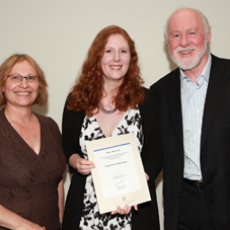
People who work in stigmatised professions, such as debt collection, legitimise what they do by coming up with creative descriptions of their role, according to research from the University of Queensland Business School.
PhD researcher Madeleine McKechnie immersed herself in the corporate culture of a large debt collection organisation for 14 months to examine how employees legitimised unpopular roles.
Ms McKechnie found that employees used one of three metaphors to reframe what they did and present it in a more positive light to themselves and others.
“Research has shown that debt collection is considered a morally and socially tainted occupation, and my experience was that debt collectors were aware of this,” Ms McKechnie said.
“I found employees would describe their job as ‘detective work’ or refer to themselves as a ‘salesperson’ or ‘financial counsellor’ in order to avoid the stigma attached to being a debt collector.
“The collectors defined what they did by drawing on meaning outside of their field, even going as far as to say ‘what I do isn’t debt collection, debt collection is going to people’s houses and repossessing things’.”
Ms McKechnie said many of the employees identified with the detective work metaphor and basically saw their role as finding people, investigating their financial situation and then holding them to account, getting them to take responsibility for the debt.
“The ‘salespeople’ were less worried about having all the information. Once they found the person their approach was really about persuasion and who was the better negotiator,” she said.
“Fewer people, but still a high proportion, used the counseling metaphor. They framed themselves as someone who helps rehabilitate people and teach them to manage their debts so that they can engage in normal society.”
Ms McKechnie said she was surprised by the results of her study – which involved observations, interviews and reviewing documents – as she had expected people to justify the importance of their role by describing its broader societal meaning.
“I expected a lot of justification to come from them saying ‘If more people paid their debts, we wouldn’t be in this situation with the Global Financial Crisis’ and there were some aspects of that but not much.”
She said the research results indicated reframing helped employees to feel better about their work, increased career commitment and removed the stigma surrounding the profession.
“Every organisation is tainted at some point of its life: everyone hates banks at the moment; investors during the GFC; BP is currently impacted by the oil spill; and council workers often get a bad wrap,” Ms McKechnie said.
“Having this alternative mechanism for explaining what you do, where it’s extracted from your organisation and indeed in some cases even your profession, can be a really helpful tool for someone to remain doing what they do and even explain what they do to other people with a sense of pride.”
Ms McKechnie said she believed her findings should help companies to manage employees with stigmatised roles.
“Not a lot of research looks at these professions that are necessary for a functioning society. It is important that employees who perform these jobs can feel positive about them.”



